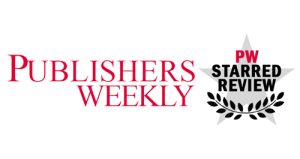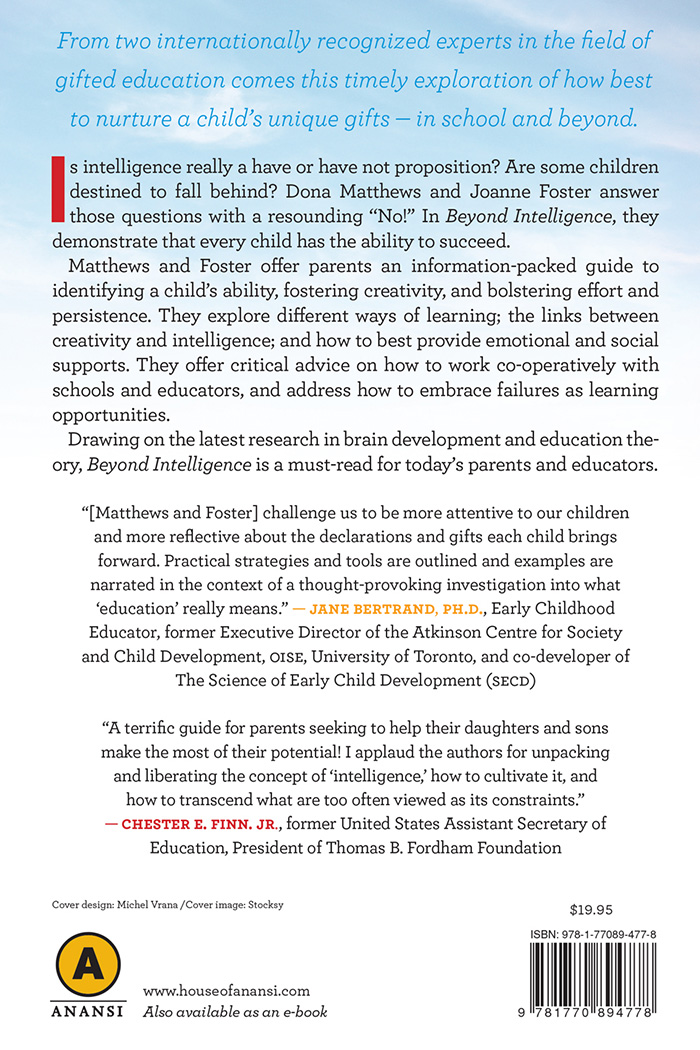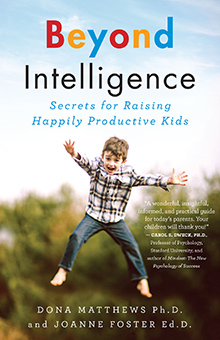Beyond Intelligence
Secrets for Raising Happily Productive Kids
By Dona Matthews, PH.D., and Joanne Foster, ED.D.
Discover how to nurture children so they become proactive learners and thinkers, and enjoy the fullness of life. Beyond Intelligence is a comprehensive book written collaboratively by Dr. Dona Matthews and Dr. Joanne Foster. They share insights, extensive knowledge, and boundless tips for raising kids who are engaged in learning, creative pursuits, and stimulating activities from infancy onward. This book has become a classic over the years, and it is must-read for anyone who seeks to empower the next generation.
Beyond Intelligence: Secrets for Raising Happily Productive Kids
By Dona Matthews, Ph.D. & Joanne Foster, Ed.D.
Published by: House of Anansi Press.
Beyond Intelligence is a parents’ guide—and teachers’ resource—that provides valuable insight into how to raise intelligent and happily productive children and teens. It’s a book that informs and inspires adults, and helps them empower kids to become strong, joyful, confident, resilient, and successful.
In today’s fast-paced world, it’s more important than ever for parents to understand and encourage the kinds of coping skills that children need for their optimal growth and well-being across the lifespan. Dr. Dona Matthews and Dr. Joanne Foster have written a reader-friendly book to help parents nurture their children’s abilities at every stage of development—from diapers to diplomas. Beyond Intelligence is also a well-spring of information for teachers, who work alongside parents in so many respects.
The tone of the book is conversational, and the authors have incorporated key concepts from their individual and combined research findings; their many years of professional practice; their experiential backgrounds; and their contemporaries’ findings in such fields as cognitive neuroscience, developmental psychology, and educational psychology. Beyond Intelligence provides parents with the tools they need to raise smarter, happier, and more successful kids.
In Beyond Intelligence, parents will discover how to help their children pursue their interests, hone their strengths, and develop their capacities into skills they can carry forward across the years. Educators will also benefit from the carefully referenced material on such topics as intelligence-building, creativity, assessments, programming, parent-teacher relationships, social-emotional development, and more.
The focus of Beyond Intelligence is on solid time-tested habits, attitudes, and behaviours–including hard work, persistence, patience, respect, and imagination—that enable children to become stronger and happier adults. The relevance and readability of this book have made it a perennial favourite!
Also available as an eBook.

A few reviews for Beyond Intelligence
“In this insightful and optimistic guide, Matthews and Foster (coauthors of Being Smart about Gifted Education) explore the premise that all children have the potential to be creative, self-reliant, and innovative thinkers. According to the authors, there are many different kinds of intelligence―Picasso, for instance, had terrific visual and spatial skills, but had learning disabilities and didn’t do well in traditional studies. In order to help kids develop and grow, parents don’t need to pay for dozens of music lessons each week. Rather, nurture happens “in the natural flow of family life,” when parents read to their children, listen to them, and explore their interests. School is still a huge part of most families’ lives, of course, and the authors devote a section of the book to formal education, considering parents’ roles at school and how they might approach tough educational decisions. Throughout, the authors helpfully redefine familiar terms. Creativity, for example, is not expressed through unpredictable artsiness; it is expressed through bringing together competence at a given task with novel insights and critical analysis. Parents everywhere will be edified and empowered by this inspiring book.”
Publishers Weekly
Starred Review
“The writing is absolutely masterful – vibrant, rich, warm, smart, accessible. I appreciated the clear and well-labeled organization, and the “Our Secret” section is brilliant, unlike anything I have seen before. This is one of the best books – if not THE best – on the topic that has come out in a long time – JUST the thing that parents – and teachers – and gifted adults seeking to better understand themselves – will want to pick up and read. Beyond Intelligence is, well, beyond excellent!”
Felice Kaufmann, Ph.D.
Creativity expert, and author of the longitudinal studies of the Presidential Scholars; Recipient of the 2017 US Presidential Scholars Award
“A wonderful, insightful, informed, and practical guide for today’s parents. Your children will thank you!”
Carol S. Dweck, Ph.D.
Professor of psychology, Stanford University, and author of Mindset: The New Psychology of Success
“Dona Matthews and Joanne Foster present parents with an evidence-based sweet spot between tiger mom and creative laissez-faire. Find advice on how to raise a child who is both disciplined and flexible, both wisely compliant and confident in one’s own path.”
Rena Subotnik, Ph.D
Director of the American Psychological Association Center for Gifted Education Policy, Washington, DC
“Beyond Intelligence is a refreshing and much-needed update on intelligence and its development.”
Scott Barry Kaufman, Ph.D.
Author Ungifted: Intelligence Redefined; co-founder of The Creativity Post; scientific director of Imagination Institute, University of Pennsylvania
“[Matthews and Foster] challenge us to be more attentive to our children and more reflective about the declarations and gifts each child brings forward. Practical strategies and tools are outlined and examples are narrated in the context of a thought-provoking investigation into what ‘education’ really means.”
Jane Bertrand, Ph.D.
Co-founder and co-author, Ontario Early Years Study; Executive Director, Atkinson Center for Society and Child Development, University of Toronto
“What a terrific guide for parents seeking to help their daughters and sons make the most of their potential! …. I applaud the authors for unpacking and liberating the concept of ‘intelligence,’ how to cultivate it… and how to transcend what are too often viewed as its constraints.”
Chester E. Finn. Jr.
Former United States Assistant Secretary of Education, President of Thomas B. Fordham Foundation in Washington, D.C.
“If you only have time to read one book on parenting, make this the book….Beyond Intelligence is itself a highly intelligent guide to parenting.”
Rosemary Evans
Principal, University of Toronto Schools
“Beyond Intelligence is a must-read book for parents, educators and professionals. Matthews and Foster provide an erudite yet personal and compassionate perspective on how to promote children’s intelligence and help them overcome obstacles in order to be more resilient and successful in life. If you want to help children be smart AND happy, read this book!”
Tracy Dennis, PhD
Associate Professor of Psychology, Hunter College, City University of New York; and parent
“Beyond Intelligence is laced with common-sense (and occasionally counter-intuitive) implications for parental practice, in which the need to deeply listen to, and understand, the child takes precedence over quick-fix commercial products or educational quackery. This book offers a refreshing alternative, and I recommend it unreservedly.”
Barry Hymer, PhD
Professor of Psychology in Education, University of Cumbria, United Kingdom
“By far the best book I have read on child development…It deserves to be a national best seller and it is a ‘must read’ for educators and parents.”
Janet King
President and founder of Kids Now
“Beyond Intelligence is the definitive almanac to help parents navigate and understand how to identify and nurture optimal learning for one’s child…. [It is] also a resource that can be referred back to time and time again as a parent interfaces with the joys and challenges encountered when raising a child to be successful.”
Josh Silvertown, Ph.D
Biomedical researcher; president, executive director and co-founder of Dream Catcher Mentoring
“Readers will benefit from the manner in which Matthews and Foster accurately address all of the current issues that modern parents face and do so in a logical and easy-to-read manner. The summaries at the end of each chapter make this book into much more than a one-time read, but a resource that can be returned to over throughout a persons “parenting” life.”
Howie Grossinger
Director/Owner Camp Robin Hood/Camp Walden/Madawaska Camps
“Beyond Intelligence is a wise and balanced approach to optimizing children’s intelligence based on the latest research on learning, development, and neuroscience, and complemented by the authors’ extensive experience. It honours the complex ways in which children develop, giving practical recommendations for sensitive guidance at each stage of development. The book is a treasure trove for parents and teachers alike.”
Marion Porath, Ph.D
Professor of Educational and Counseling Psychology and Special Education, University of British Columbia
“Thank goodness Dona and Joanne have written another book! By sharing personal stories, research, and practical strategies, Drs. Matthews and Foster have created a handbook that should sit on every parent’s shelf. As an elementary school principal and a parent, I applaud the authors’ nuanced approach to the discussion around intelligence and its implications for children, parents, and schools.”
Nancy Steinhauer
Award-winning school principal, and parent
“Beyond Intelligence carries a beautiful message—our kids all have unique abilities and challenges. Take the essence of each individual child and run with it to achieve the best possible result. With the expertise of these highly qualified writers, each personality trait deserves enriching, and each perceived problem has a thoughtful, hands-on, and concrete solution.”
Shelley Peterson
Best-selling Young Adult novelist and parent
“Everyone look up! The heavens have opened, sending guidance in the form of Beyond Intelligence our way. And just in time. For we live in an exponentially complex and fast-paced world that baffles many of us: parents, educators, and children alike. Enter Matthews and Foster who part the veils to show us paths to meet children’s needs in a holistic, caring, and Uber-Educated/Analytical, well-researched, manner. If you purchase one book for raising your child, this is the one. Why? Because it allows one to see and meet the needs of our progeny using a mastery model enriched with a positive mindset-models that indeed work and endure for the ages.
Once upon-a-time, some seventy years ago, Benjamin Spock revolutionized child- care with his The Common Sense Book of Baby and Child Care. Now we are in the midst of another child-care revolution thanks to Beyond Intelligence. Matthews and Foster lead us, as Taoist priests might, to the proverbial place of balanced harmony and knowledge. They joyously free parent, educator, and child from the cave-like shackles that keep one divining shadows on the wall. Instead, the cave doors are opened and we are free to explore the celebratory light.
Being a parent or educator is the most daunting task, as is being a child that must continuously navigate the world in order to achieve meaningful adulthood. Enter the authors who advise that understanding and meeting the needs of a child on any level requires us to, at times, “lighten up and step back…” as well as have a sense of humor. As the parent of a thirty-four year old, advice I still need. But Beyond Intelligence, to be sure, was not intended as a parent guide in the Spockian manner, although it achieves that god-like status with such chapters as: Diapers to Diplomas and Raising Children to Thrive. However, what this work was intended to do was to educate us all on intelligence, creativity and meeting the needs of all children: those needing educational or social interventions and/or being gifted a la Howard Gardner’s paradigm of gifted intelligences and/or…the list and combinations presented in this book are wonderfully endless.
Yet, Beyond Intelligence, despite the serious nature of its topic, is so approachable and readable that it should be published in every known language and made mandatory reading for parents as well as children who are developmentally able to follow-it. Despite the serious nature of this tome, its chapters are not only informative, but also delightful and playful at times. Every chapter has a theme, a quintessential explanation of that theme, actual case studies, thought-provoking quotes by Einstein and other geniuses from every walk of life, checklists, and authors’ secrets.
This book is chock-full of “how-to” strategies on every level: such as, advocating for one’s child in a school system, reducing bullying/cyber bullying, finding the best educational fit, understanding tests and assessments, educating teachers, and, inter alia, analyzing the problems that children experience: boredom, finding friends that are a good match, perfectionism, and finding a positive learning or social environment.
Additionally, in Being Intelligent, the reader will meet the ground-breaking ideas of many noted researchers and writers such as positive mindset author Carol Dweck, Joyce VanTassel-Baska, Carol Tomlinson, Robert Sternberg, and my personal favorites Sally Reis and Joseph Renzulli who brought us the ground-breaking “School-wide Enrichment Model.”
Clearly, this work is as complete a roadmap for raising happily productive kids as one can find anywhere on the planet.So what more can one say about a book that should be on everyone’s gift-giving list? Just this: that it brought this otherwise stoic reviewer to joyful tears. To know that there is a guide, Beyond Intelligence, to assist us all in meeting and helping children traverse what confounds, alienates, or hurts them (as bullying or an uncaring adult might) is a gift to each of us and the society-at-large. Thank-you Matthews and Foster for taking us by the hand down a path and into the celebratory light.”
Howard Fuchs
NYC Teacher; Instructor, Hunter College City University of New York; and parent
Table of Contents
About the Authors
Introduction
Chapter 1. Starting with Intelligence
- Smashing the Crystal Ball
- What’s Your Score? (And Does It Matter?)
- So Many Ways of Being Smart
- Mindsets and More
- So, What Is Intelligence?
- Our Secrets: Starting with Intelligence
Chapter 2. Intelligence and Creativity
- Insect Force and the Venus Fly Traps
- What Makes Someone or Something Creative?
- Ten Creative Thinking Habits
- Timelessness: Experiencing the State of Flow
- Curiouser and Curiouser
- Our Secrets: Intelligence and Creativity
Chapter 3. The Changing Demands of Parenting: Diapers to Diplomas
- The Early Years: Building a Better Brain
- Childhood: Developing Interests, Habits, and Skills
- Early Adolescence to Mid-Adolescence: Peril and Possibility
- Late Adolescence and Early Adulthood: Higher Learning
- Our Secrets: Diapers to Diplomas
Chapter 4. A Parents’ Guide to Tests and Assessments
- Four Basic Principles
- What Are They Really Testing?
- Measuring Up
- Solving the Mystery: It’s All About Mastery
- Hidden Costs of Labeling Children
- Our Secrets: Tests and Assessments
Chapter 5. Education: Parents’ Roles at School
- The Teacher’s Point of View
- Making Changes Together
- What Matters?
- About Assumptions
- Advocacy in Action
- Our Secrets: Parents’ Roles at School
Chapter 6. Education: Teachers’ Roles, Responsibilities, and Requirements
- Classroom Essentials for Teachers
- Classroom Ideas That Work
- A Four Part Framework for Teaching Kids: Planning, Assessment, Activities, and Learning Environment
- Thought-Provoking Questions
- Our Secrets: Teachers’ Roles, Responsibilities, and Requirements
Chapter 7. Decision-Making about Schooling
- The Good, the Bad, and the Mediocre
- What Are the Choices?
- What’s the Evidence?
- School Is Not Enough
- Dilemmas and Decisions
- Our Secrets: Decision-making about Schooling
Chapter 8. Possible Complications
- Inferences, Assumptions, and Truth
- Being Different
- Strengthening Emotional Intelligence
- Developing Resilience and Coping Skills
- Boredom
- Fear of Failure and Fear of Success
- Perfectionism
- Laziness
- Procrastination
- Self-Confidence
- Our Secrets: Addressing Possible Complications
Chapter 9. The Social Context: Friends and Others
- Why Do Friendships Matter?
- How Can Parents Help?
- Bullying
- Parents’ Questions about Cyberbullying
- Social Context Matters
- From Strength to Strength
- Siblings
- Our Secrets: The Social Context
Chapter 10. Raising Children to Thrive
- Going Beyond Intelligence
- What If My Child Is Not So Intelligent?
- Putting It All Together
- Realizing the Promise of Ability
- Our Final Secrets for Raising Happily Productive Kids
A few excerpts from the book:

What is the target audience for this book?
Beyond Intelligence is for parents who want to support and encourage their children’s development, including their intelligence, creativity, ways of learning, and social-emotional well-being. The authors write (on page 1), “The best nurturing happens in the natural flow of family life.” And so, this is very a family-oriented read. This book will also help teachers, caregivers, and health professionals in their efforts to understand and nurture children’s optimal growth.
What is the main focus of this book?
Dr. Dona Matthews and Dr. Joanne Foster “unravel widely held misconceptions about ability, and about what it means for children to become smart, and stay smart” (p. 2). Throughout Beyond Intelligence, the authors discuss how children can become happily productive; they use questions, anecdotes, and examples to clarify parenting experiences; and they “offer suggestions that enable parents to respond more fully to their children’s real learning needs, curiosities, and interests, thereby kindling their enthusiasm for learning” (p. 2). The book is filled with practical and life-affirming strategies.
How many pages are there in this book?
There are 290 pages in Beyond Intelligence.
Why is Dr. Foster qualified to have written this book?
Dr. Joanne Foster joined forces with Dr. Dona Matthews to write this book. They share information about their work with parents, children, teachers, and professionals across diverse communities, and their research and teaching experiences at the University of Toronto. Beyond Intelligence is a result of many years of collaboration, and a melding of the authors’ areas of expertise: Dr. Matthews as a psychoeducational consultant and psychologist, and Dr. Foster as a teacher, and gifted education specialist and consultant. Both authors are parents, teacher educators, and seasoned advocates, and they are passionate about cultivating meaningful learning opportunities for children, teens, and families.
What supplementary resources can readers find within this book?
Beyond Intelligence contains twenty pages of detailed endnotes, organized chapter by chapter (pp. 249 – 269). The authors also provide a comprehensive index with hundreds of entries (pp. 271 – 285). Plus, each chapter concludes with a segment called “Our Secrets” wherein the authors provide a recap of key concepts.
What kinds of reviews has this book received?
Beyond Intelligence received a coveted Publishers’ Weekly starred review, calling it “insightful and optimistic,” and noting, “Parents everywhere will be edified and empowered by this inspiring book.”
Other reviews comments include, “By far the best book I have read on child development,” and “a must-read book,” and “the definitive almanac to help parents navigate and understand how to identify and nurture optimal learning,” and “a refreshing and much-needed update on intelligence and its development.” For additional reviews, see the “Reviews” tab on the Beyond Intelligence page on this website.
Are there any illustrations or charts in this book?
There are several quizzes—for example, Parenting for Creativity, p. 47; A Home and School Quiz, p. 126; Your Child’s School, p. 150; Do You Foster Your Child’s Emotional Intelligence? p. 182; and Are You Raising Your Child to Thrive? p. 240. There are also many checklists—for example, Brain-Building Experiences, p. 55; Advocacy Strategies for Parents, p. 125; Community-Based Learning Options, p. 171; Good Assessment Practices, p. 140; Successful Learning Environments, p. 148; and Resilience and Coping Skills: Helping Kids Deal with Challenges, p.187.
How can I see samples of the content of this book?
There is an “Excerpts” tab on the Beyond Intelligence book page on this website.
Is there a book club guide or other online material that supplements this book?
Yes. A book club guide is available under the “Guide” tab on the Beyond Intelligence page on this website.
Related Blog Posts
Science Fairs: Yes? No? Maybe?
This piece focuses on the topic of school science fairs. There are questions raised about the nature and viability of such fairs, and then the author shares material conveyed in an interview in the Journal for the Education of Gifted Young Scientists.
Being Consciously Upbeat!
We live in a world wherein life can be challenging and unpredictable, and change is inevitable. The focus of this article is on the importance of striving to be consciously upbeat – even when facing difficulties.
Kids and Nonfiction Books
“Nonfiction books provide information, strategies for doing and learning, and new perspectives.” Discover how to fortify kids’ reading selections across genres, and encourage their interest in nonfiction books. They’re gateways to pleasure and infinite possibilities!









